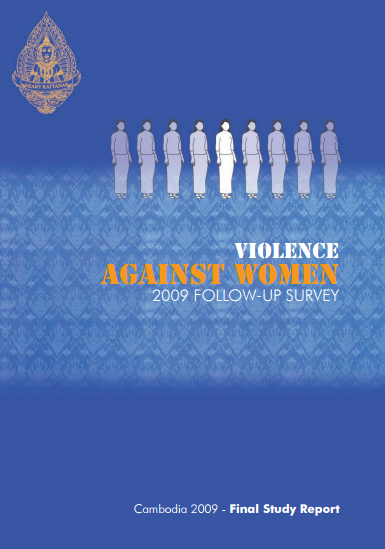
Violence Against Women
Publication Year: 2010 / Sources: Ministry of Women’s AffairsViolence Against Women has a serious impact not only on those who experience it, but on the country’s social and economic situation as well. To address the serious toll that domestic violence takes on Cambodia, the Royal Government of Cambodia (RGC) has made reducing DV a priority. In particular, the RGC is focused on addressing the Cambodian Millennium Development Goal (CMDG) 3, which aims to “promote gender equality and empower women”
Download: English | Khmer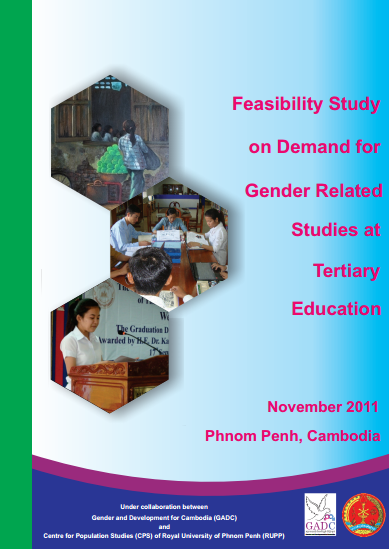
Feasibility Study on Demand for Gender Related Studies at Tertiary Education
Publication Year: 2011 / Sources: Gender and Development for Cambodia (GADC) and Centre for Population Studies (CPS) of Royal University of Phnom Penh (RUPP)This study aims to explore the demand for gender studies at the level of tertiary education, potential aspects of gender courses to be taught and potential barriers for universities to provide such courses.
Download: English | Khmer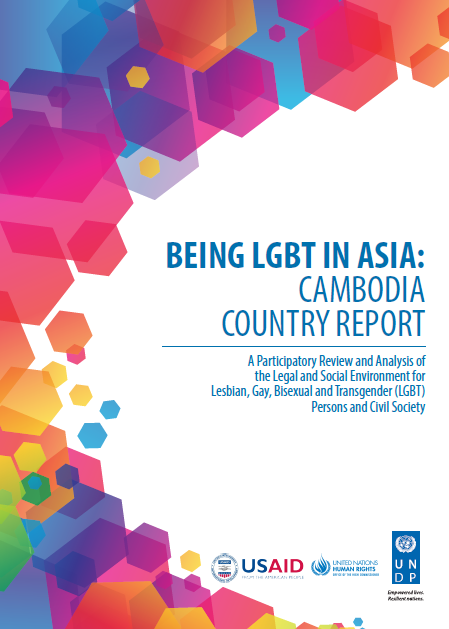
Being LGBT in Asia: Cambodia Country Report
Publication Year: 2014 / Sources: UNDP & USAIDThis report reviews the legal and social environment for lesbian, gay, bisexual and transgender (LGBT) people in Cambodia. It is a product of the Cambodia National LGBT Community Dialogue held in January 2014 in Phnom Penh. The National Dialogue brought together 59 participants from 18 provinces representing Cambodia’s LGBT organizations alongside representatives of multilateral and bilateral organizations, development partners, universities, and non-governmental and community-based organizations working in areas related to LGBT rights.
Download: English | Khmer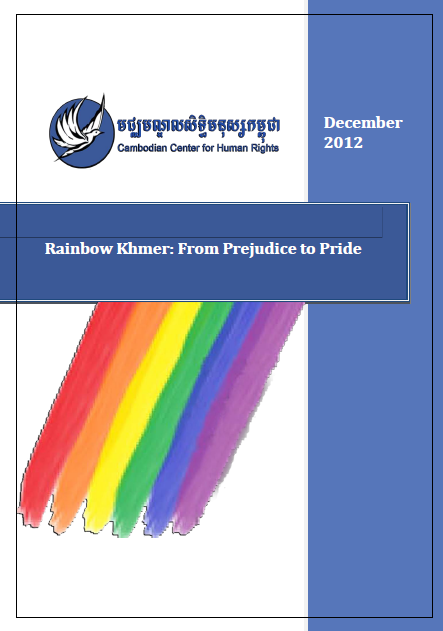
Rainbow Khmer: From Prejudice to Pride
Publication Year: 2012 / Sources: the Cambodian Center for Human Rights (CCHR)This Report aims to establish a vision whereby LGBT’s people human rights are fully protected by law, respected in practice, and recognized universally. It takes a thematic approach, looking at different aspects of LGBT’s people lives in turn, and provides positive recommendations both legislative and non-‐legislative that are intended to support and accelerate the establishment of this vision.
Download: English | Khmer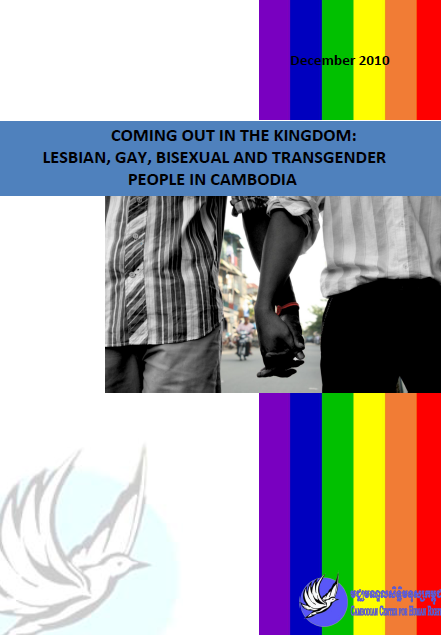
Coming out in the Kingdom: Lesbian, gay, bisexual and transgender people in Cambodia
Publication Year: 2010 / Sources: Cambodian Center for Human Rights (CCHR)In a country still recovering from the impact of years of civil war and repression, and in a society already faced with ongoing human rights abuses in numerous areas, lesbian, gay, bi-sexual and transgender (“LGBT”) individuals in the Kingdom of Cambodia (“Cambodia”) face a difficult challenge in achieving equality. While homosexuality is not illegal in Cambodia, LGBT people are often politically and socially marginalized.
Download: English | Khmer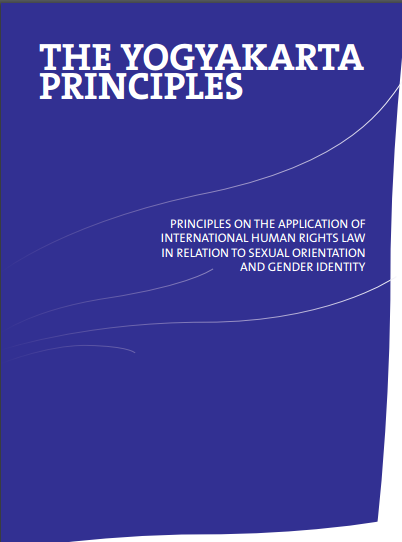
The YOGYAKARTA Principles: Principles on the application of international human rights law in relation to sexual orientation and gender identity
Publication Year: ២០០៧ / Sources: UN Human RightsThe Yogyakarta Principles address a broad range of human rights standards and their application to issues of sexual orientation and gender identity. The Principles affirm the primary obligation of States to implement human rights. Each Principle is accompanied by detailed recommendations to States. The experts also emphasise, though, that all actors have responsibilities to promote and protect human rights.
Download: English | Khmer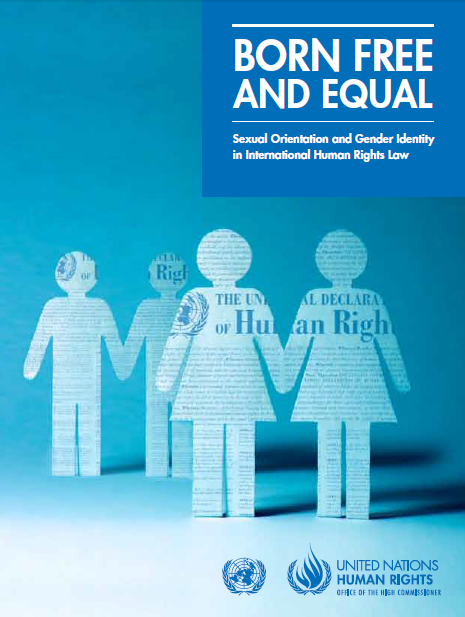
Born Free and Equal
Publication Year: 2012 / Sources: United Nations High Commissioner for Human RightsThe High Commissioner’s report presented evidence of a pattern of systematic violence and discrimination directed at people in all regions because of their sexual orientation and gender identity – from discrimination in employment, health care and education, to criminalization and targeted physical attacks, even killings. The report included a set of recommendations addressed to States designed to strengthen protection of the human rights of lesbian, gay, bisexual and transgender (LGBT) persons.
Download: English | Khmer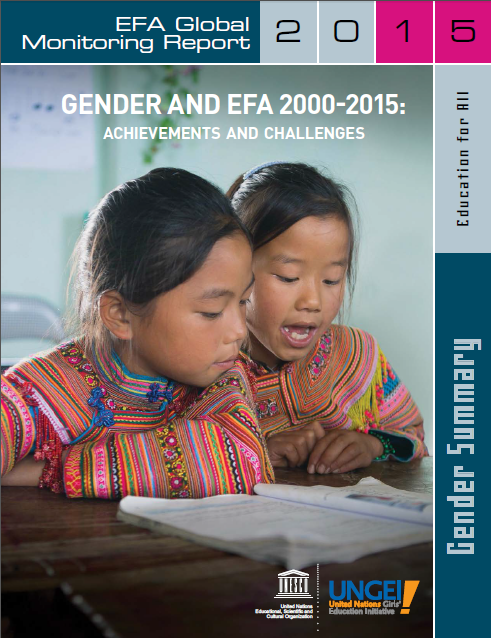
Gender and Education For All 2000-2015: achievements and challenges
Publication Year: 2015 / Sources: United Nations Educational, Scientific and Cultural Organization (UNESCO)This report provides detailed evidence of how much has been achieved in the past 15 years but also where considerable – some quite intractable – challenges remain. It highlights notable progress in gender parity in primary and secondary education, particularly in South and West Asia, while underscoring the persistent barriers to achieving gender equality in education.
Download: English | Khmer
United Nations Convention Against Corruption
Publication Year: 2003 / Sources: United NationsThe purposes of this Convention are to promote and strengthen measures to prevent and combat corruption more efficiently and effectively; to promote, facilitate and support international cooperation and technical assistance in the prevention of and fight against corruption, including in asset recovery; and to promote integrity, accountability and proper management of public affairs and public property.
Download: English | Khmer
Law on Associations and Non-governmental Organizations
Publication Year: 2015 / Sources: National Assembly of the Kingdom of CambodiaThis law aims at safeguarding the right to freedom of establishing associations and non-governmental organizations in the Kingdom of Cambodia in order to protect their legitimate interests and to protect the public interest, as well as to promote partnership cooperation between associations and non-governmental organizations and the public authorities.
Download: English | Khmer